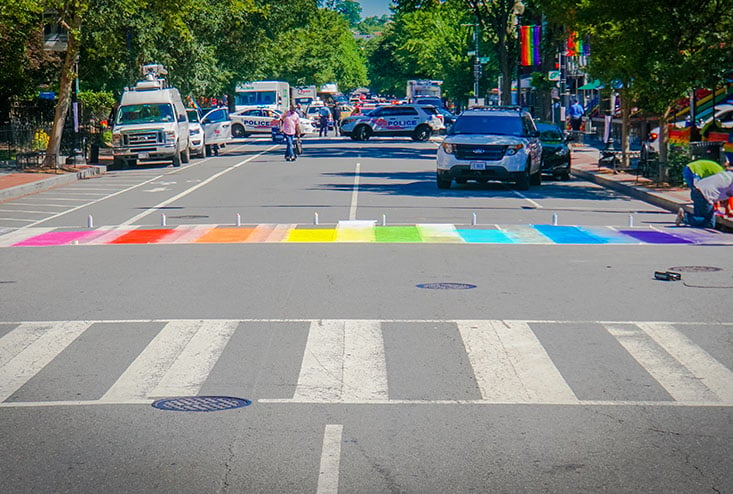A new crime wave has gripped the country, and this time progressives are calling for harsh penalties, even charging teenagers with felonies. That’s because this crime is political, and these teens are accused of disrespecting the flag—the pride flag, that is.
The latest front in the culture war is the humble urban crosswalk.
Hip cities across the land, or at any rate cities that want to be perceived as hip, have taken to repainting crosswalks with the colors, stripes and chevrons of the LGBTQ flag. In some places, this is a “Pride Month” display—but elsewhere, including in Nashville, Tennessee, Alexandria, Virginia, and Westport, Connecticut, these are permanent changes to the cityscape.
If these municipalities had put up statues honoring war heroes or Founding Fathers, teen vandalism with a political edge might be tolerated. But in Delray Beach, Florida, and Spokane, Washington, teens in pickup trucks or on Lime scooters are peeling out their tires on the sacred emblem of every-sexuality-but-hetero, and for that there’s zero tolerance.
Nineteen-year-old Ruslan Turko and two unnamed minors are charged with first degree malicious mischief in Spokane. Do police there usually make a priority of chasing down kids who leave skid marks on crosswalks? Those teens aren’t in trouble for what they did but for what they thought and meant—and what one of them is alleged to have said: “F–k you, f—-t!”
It’s not easy to get arrested in America’s cities just for using four-letter words or marking up a road with tire tracks, but for speaking ill of queer people and defacing their symbol? We still have the First Amendment, but the separation of church and state doesn’t apply to sexuality and state.
So we have, in effect, a new kind of blasphemy law prohibiting insults against gay symbols instead of religious ones.
Delray Beach police spent a week investigating the crime of defacing a crosswalk flag there before 19-year-old Dylan Brewer turned himself in. He’s charged with felony mischief, too.
Law enforcement put out a statement making the ideological nature of his offense clear: “The reckless action caused significant damage to the streetscape painting, which serves as a symbol of unity and inclusivity for the LGBTQ community.” This was no mere traffic violation.
The country might be a calmer place if rowdy teenagers were routinely busted for anti-social behavior. But the cities treating these kids like Jan. 6 protesters aren’t trying to clean up the streets—they’re legislating morality.
Even now, liberals insist they’re against that: They still say it’s unconstitutional when Louisiana passes a law that puts the Ten Commandments in every public-school classroom in the state.
Progressives would never countenance painting a Christian cross on a public crosswalk. But what makes one group’s symbol of pride different from another’s symbol of love?
What gives the LGBTQ community a right to an official presence in public that’s denied to religious believers?
“The legitimate powers of government reach actions only, & not opinions,” wrote Thomas Jefferson in the same 1802 letter to the Baptists of Danbury, Connecticut, where he characterized the First Amendment as “building a wall of separation between Church & State.” The Danbury Baptists weren’t enemies of religion, of course—their complaint was that they should not be taxed to pay for a religion that wasn’t their own, in this case Connecticut’s established Congregationalist church.
But if Baptists shouldn’t be taxed to pay for Congregationalist privileges, and if it’s unconscionable to tax Jews to pay for Christian public symbols, why should all religious believers—many of whose traditions teach morals incompatible with queer lifestyles—be taxed to pay for gay pride?
Progressive sexuality is as exclusive as any religion: if you doubt that, ask anyone leading a pride parade whether “straight pride” is part of the celebration. A sexual identity is unavoidably a moral identity, just as a religious one is.
In other contexts, progressives say America is a pluralistic country that can’t impose one view of disputed moral matters on everybody through government power. But they make an exception to that where sexual morality is concerned.
There’s a fork in the road here: If liberals want to separate church and state, they have to acknowledge that the same principle separates sexuality and state, and pride-flag crosswalks violate the principle.
A conscientious religious believer, or unbeliever, should no more be forced to pay for the symbols of somebody else’s sexuality than he or she should be coerced into paying for somebody else’s church.
Alternatively, liberals can reject their hypocrisy and admit that if city governments are free to subsidize and publicly promote gay pride, the state of Louisiana or any other state can publicly honor a religion.
The teens who vandalized the Delray Beach and Spokane crosswalks were wrong to do so. But they’ve called attention to another wrong—the one committed by those cities that have enshrined sexuality as an official religion.
COPYRIGHT 2024 CREATORS.COM

Leave a Reply